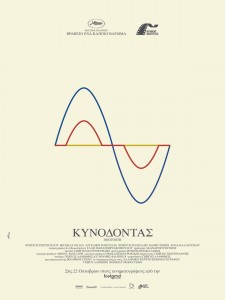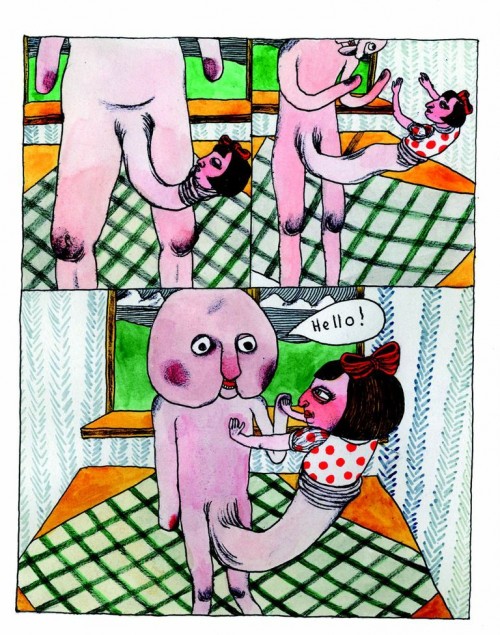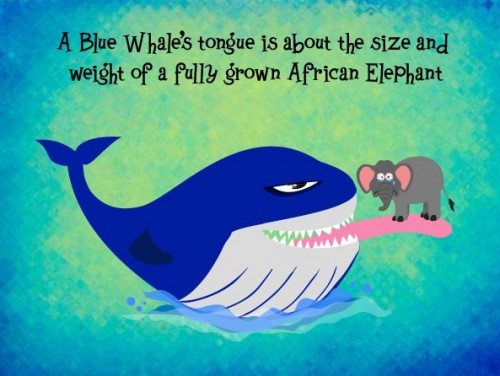LOSING CANINE TEETH: IDEAS SPURRED BY A MODERN GREEK FILM THAT IS NOT ABOUT MODERN GREECE
A DISTANCE FELT
I have a friend who I like spending time with but rarely end up seeing. The friend is a good person whose time means a lot, especially when it is shared with me. We call each other difficult, but what that means is that we like to hang out when we really want to, and refuse to negotiate our visceral wants for the other. It is a circumstantial friendship, despite its organicness. A major issue that arises frequently and poses Herculean efforts on both of our ends is that the friend lives in Brooklyn. [1] Despite the physical distance, it was the friend’s turn to come to me, because last time I went to Brooklyn, and I walked the Williamsburg bridge back and forth without ever seeing the friend, because the friend was asleep and never woke up and stood me up, and for that reason the friend would have to come to me this time and this was a non-negotiable term in an unwritten legal contract.
We decided to go to an East Village staple called “Sidewalk,” which is on Avenue A, and my friend grimaced a lot with my decision, because “how 90s grunge.” What the friend was going to witness would be a surprise, because this space was renovated ala gentrification in 2011 and there were no grimey aspects of my tall burger the very attractive (in a 90s way) waitress served me as she spoke in the familiar raspy voice that exuded bits of smoke here and there. [2]
What is interesting about where we chose to sit–which of course was the eastern side that functions as the smoking section of the outdoor seating area–is that it is located exactly near a gay bar called “Eastern Bloc,” which some people say belongs to Anderson Cooper’s boyfriend. [3] It was during our meal, or actually my meal since the friend was only drinking, on the smoking sidewalk that we witnessed a peculiar verbal fight in the street, the kind of fight that is violent only because of the words involved and how they were spat by people: aggressively and malevolently. It ended with someone calling a gay person a faggot, but the shock value was only increased when the assaulter and the gay person who stepped on his sneakers because he was too distracted by his phone were separated by a larger distance. It was then that the assaulter widened his eyes and tried to cajole his audience–us–with his empowering statement as he turned around and declared to bystanders of this incident: “It’s okay. I am gay, too.” READ MORE >
Seattle Author Spotlight (5) — Matthew Simmons
This is the 5th Seattle Author Spotlight (previous ones were Richard Chiem, Maged Zaher, and Deborah Woodard) and I plan on running new Spotlights every 10-14 days because Seattle has plenty of talented and interesting writers.
Matthew Simmons:
When I first emerged a little from my cave in Kirkland (not far but really far from Seattle) it was to see Matthew Simmons read from “A Jello Horse.” Later on as I started attending more events I ran into Matthew over and over (at a Patricia Lockwood reading, at a CAConrad reading, at APRIL, etc) and enjoyed many little chats with him. Recently I was glad to be part of the big crowd at the Hugo House for the release party and reading of Matthew’s new book “Happy Rock” at which Matthew read with great confidence the story about the exploding mothers–read it, in fact, in front of his mother, his father and, as Matthew said, “all the people (he) loves.”
Introducing Matthew that night Brian McGuigan quoted from Paul Constant’s excellent review that had just come out in The Stranger:
Matthew Simmons has never misused a word in his life, or at least that’s how it feels. His prose manages to be economical and exact, while at the same time suggesting a broader universe that ripples out from every sentence. It’s like handing someone a few Lego bricks, bending down for a second to tie your shoes, and then looking back up to discover they’ve built a palace. READ MORE >
The Beginner’s Guide to Hegel

Jesse Hudson, one of the most monastic and scholarly people I know, started talking about Hegel on Facebook. Hegel’s work has always felt intimidating to me, and often when I read his writing, I think that he’s totally full of shit—that he took simple, intuitive ideas and hyperinflated their elucidation to appear logically rigorous and philosophically masterful. Basically, I got thinking that Hegel was a damned charlatan.
But I also knew that Jesse deeply responded to Hegel’s philosophy. So I asked him some questions for the Hegel-averse and uninitiated, following the format of The Beginner’s Guide to Deleuze with Christopher Higgs. Here we go:
Why should we read Hegel?
Hegel is fucking difficult, right?
In order to proclaim the importance of reading Hegel, the initial hurdle to overcome is the impression one initially has in regards to the supposed difficulty (or, stated more extremely, incomprehensibility) of Hegel’s texts. This isn’t necessarily a misinformed opinion of Hegel since, without doubt, Hegel’s texts are extraordinarily rigorous and densely packed. It isn’t uncommon to spend hours (or hours and hours over the span of several days) unpacking a mere page or two of his Phenomenology or Logic. This is due, in large part, to the fact that Hegel (like, it must be admitted, any other philosopher) writes with his own peculiar terminology. Derrida has differance; Deleuze has rhizome; Hegel has being-for-self, negation of the negation, positing presuppositions, ‘sublation’, being-in-and-for-self, etc. Hence, reading Hegel involves a great deal of work that is not unlike the work involved in learning a new language. But, to paraphrase Derrida, you wouldn’t necessarily decry the difficulty of a thermonuclear physics text or a text discussing the subtleties of semiotics and differential calculus. Therefore, the cries of anger and frustration seem a bit odd when directed towards philosophy (texts that are undoubtedly as theoretical and ‘specialized’ as the previous examples). READ MORE >
Great Here
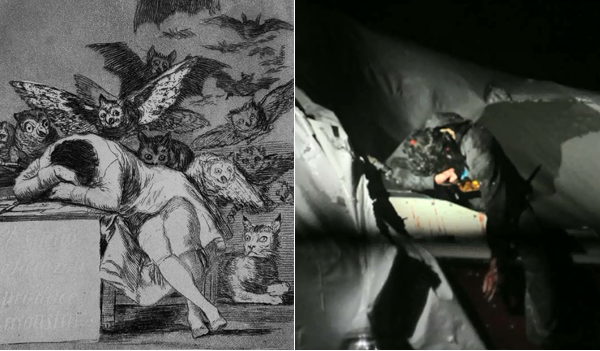
In reaction to Dzhokhar Tsarnaev beautifully gracing the cover of Rolling Stone, with great hair the less-disheveled would pay for, a Massachusetts State Police officer released photos of “the real Boston bomber,” as a kind of ultimate #nofilter, featuring one of the boy painfully climbing out of the boat he was hiding in. A sniper’s rifle laser falls short of the Hindu third-eye, but we’ll take that red dot as a kind of more precise Western spirituality. Francisco Goya’s “The Sleep of Reason Produces Monsters” (c. 1798) is probably the most iconic of Los Caprichos, a set of 80 satirical etchings condemning Spanish society for its superstitious pedagogy and foolish ruling class. “The author is dreaming,” he remarks of the print. “His only intention is to banish harmful superstition and to perpetuate with this work of fancy the sound testimony of Truth.” Little did he know that we, as idle linguists with something to grind, would chew on such Truth like termites over the course of a ruined home. The author ducks from his very thoughts, portrayed by flocking owls, only to be banished within the very consciousness from which such birds are cracked. It’s not great here, the mind. In 1970, Charles Manson was featured on the cover the Rolling Stone — with likewise great hair, which may also invoke Jimi Hendrix, Britney Spears, George Harrison, Kurt Cobain, Justin Bieber, Johnny Depp, Amy Winehouse, Madonna, et al., etc., ad infin. Short of reducing such talented people to their hair, we might consider whose demand the magazine is supplicating. As part of the American dream i.e. code for commerce, appalled dissenters are free to not buy a copy, and stores — in timid solidarity with its ruling class, the consumers — may boycott that issue, or the magazine in general. My guess is they’ll be fine. Two wrongs don’t make a right, but a market return. In our grand national narcolepsy, may we have a lucid dream in which we wake, one so lifelike and real — with bells and whistles, traffic jams and hail, love and murder — that it seems, with insane conviction chaperoned by invented beasts, that we are awake.
U.K. Author Spotlight (1) – Gary J Shipley
Realizing that they speak and read English in the U.K. and that they write in it too (and because I’m originally from South Africa a kind of diamond and veldt version of the U.K. with much better weather and beaches), I’ve decided to start a new feature that follows kind of in the vein of the Seattle Author Spotlight series. So, periodically, now, I will be featuring a U.K. author.
And the first UK Author Spotlight’s of Gary J Shipley. Gary and I recently became email and Facebook “chums” (see how easy this is?) and then he did a nice write-up on my new book and I blurbed his forthcoming book of poetry. Gary and I swap quite a lot of emails and Facebook “Likes” (these, hint-hint, make me feel really, really great.)
Gary’s smarter than me, much more philosophical and is able to write a Godless sort of language and landscape that I envy tremendously. When I saw the movie Pina I thought about Gary’s poetry. Gary is also an Artist. Kind of like Michaux. But different. I look very much to one day meeting Gary in person.
Also, fyi, this is what Brian Evenson has to say about Gary’s “Dreams of Amputation“:
Dreams of Amputation reads like the nightmares Derek Raymond might have experienced if he’d written cyberpunk. An exceptionally strange work, but a smart and thoughtful one as well. Disturbing, haunting, and inimitably weird, this is a book like no other.
So, anyways, Gary J Shipley’s Author Spotlight consists of a brief interview, Bio photo and Art.
Brief Bio:
Gary J Shipley is the author of eight books of various sizes. His latest is forthcoming from Blue Square Press. He has published in Gargoyle, The Black Herald, Paragraphiti, elimae, >kill author, nthposition, 3:AM, and others. More details can be found at Thek Prosthetics.
Brief Interview:
Rauan: Does the British Bulldog have any teeth left? (ie, can you tell us a bit about the state of British Literature, fiction, poetry, whatever)
Gary J: Yes. It has a single brown stump that bends when it bites you. READ MORE >
These 15 Books Need You

a.k.a. “Playing catch up with the stacks [6].”
In this series I share with you a stack of my recently acquired and most anticipated reading materials. The last time I did one was back in March. In 2012 I did one in November, August, and March, and in 2011 I did one in May.
This time, I figured I would review them, taking as my formal inspiration Julia Cohen & Mathias Svalina’s short-lived but totally rad Home Video Review of Books.
Now then…
The Graphic Canon (3) — Bringing the Word into Different Life
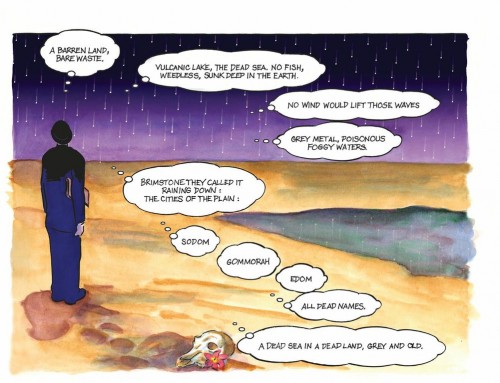
Art/Adaption of Joyce’s Ulysses by Robert Berry w/ Josh Levitas — Here Bloom’s musin’ serious on the beach
*****
[ The Graphic Canon (3), Seven Stories Press, Edited by Russ Kick ]
*****
Publishers Weekly says The Graphic Canon 3 is “the most beautiful book of the year.” And I can’t disagree.* The Graphic Canon 3 (Series 1 is from Gilgamesh thru the 1700’s and Series 2 is the 19th century) is a big, colorful and wonderful 576 page collection of graphic versions and adaptations of important (canonical?) 20th century literature accompanied by helpful notes in which the series editor (Russ Kick) tells a bit about the author and his/her work as well as some background info on how the particular artist adapted it.
(* – There might be other great and beautiful ART and Photography coffee-table “books;” popular “books” of awe-inspiring horse photos, or incredibly cute puppies or kittens; but this is ART about and often consisting, for the most part, in great literature. Some of the ART is breathtaking. And also breathtaking, sometimes, is the ways in which the ART engages and interprets the source text.)
So, ok, yeah, it’s a beautiful book that I think also will provoke much thought and discussion– and in this write-up I’m going to sketch out 4 ways in which I personally engaged with it.
*****
However, first I want to bring up a few possible negatives: READ MORE >
July 18th, 2013 / 1:06 am
circa 28 Points: A Basic Guide by Nick Sturm
- I saw Nick Sturm once in a dive bar, I think. He had a ponytail. I thought, “I like guys with ponytails.”
- The cover of A Basic Guide is either a yarn mobile, the meanderings of a dragonfly when stimulated by a drop of sugar, or a rough sketch of a sailing frigate. It’s by Amy Borezo, who has a history of time and motion, intersections of paper, interactions of words…It seems an apt choice for a book cover, this artist.
- I have a ponytail. My enjoyment of ponytails is entirely self-serving. It makes me feel less alone.
- A guide is an appropriated form. The world is potential structure. Lorrie Moore wrote a guide. Ander Monson wrote a guide. Here’s a cool one by Melanie Rae Thon. A guide seems to imply an alembic of knowledge, this idea possibly used as ironic, as conceit, or as straight up earnest.
- It is not light that we need, but fire; it is not gentle shower, but thunder. We need Sturm, the whirlwind, and the earthquake.

- There is a wistful nostalgia here that kindles of Richard Brautigan. This longing is transferred through an accumulation, not through explicit yearning, so then A Basic Guide becomes a sort of kitchen drawer or curio cigar box—it shows, but yet stores away, creates a poetic idyll, a space: horses, petticoat, jubilee, levee, these types of wonderful that might be leaking away, might be in need of storage, little mysteries to keep in a Mason jar.
- “The way the kiss stays locked in the machine.”
- “…but the past was like a bleached coral reef.”
- Once my ponytail was “He’s sort of a cute hippie.” Now my ponytail is all, “age-inappropriate/flaky/I bet he has a ‘writer satchel’/guy you see at AWP” sort of thing. But that’s OK. Things change. Like can be hard, but there are beautiful things, too, you know. READ MORE >
Dear Rauan,…(3)
*****
[ note: I’ve never been happier, never felt more fulfilled, because I know that I am helping people — and thanks again to Kim Gek Lin for turning me on to this xoxox ]
*****
and this time we have a desperate cry for help from Paul in Massachusetts:
dear rauan
my wife won’t fuck me because I’m not “alt lit” enough and when we do get hot and heavy she demands we role play tao lin and marie calloway doing 69 while we’re tripping on shrooms. And I just can’t do it, rauan, even though it does sound very erotic. One time, also, a whale stuck its head out of my wife’s Mumu (yes, this is what she makes me call it) and started licking my balls
and i was just freaked out
and i was just freaked out
and i was just freaked out
and i was just freaked out
…
…
is there something wrong with me, rauan?
thank you in advance,
Paul “boost” Refrere
*****
*****
And, so–
Rauan Responds:
*****
Dear Paul,
1) first of all, “tao lin” READ MORE >
Seattle Author Spotlight (4) — Greg Bem
This is the 4rd Seattle Author Spotlight (previous ones were Richard Chiem, Maged Zaher & Deborah Woodard)
And it’s Greg Bem!
Greg was one of the first Seattle writers I saw read/perform here in Seattle and Greg was one of the first Seattle lit people I actually talked to here in Seattle. Greg was really friendly and every time I saw him (he seems to be everywhere, reading, video taping, listening, enjoying, networking) he introduced me to other people. He also invited me for Mexican Happy Hour and that was grand. Greg also organizes readings in bars, on trains and in abandoned buildings, etc.
Greg, in his own words, is mainly a “situational poet”, preparing text (sometimes accompanied with video, music, musicians, etc) that’s only for that situation, that performance. Greg, though, is set to leave for Cambodia and will be gone for at least six months. He will be missed.
Here, on the other hand, is a link to some poems Greg just got published on-line.
Brief Bio:

